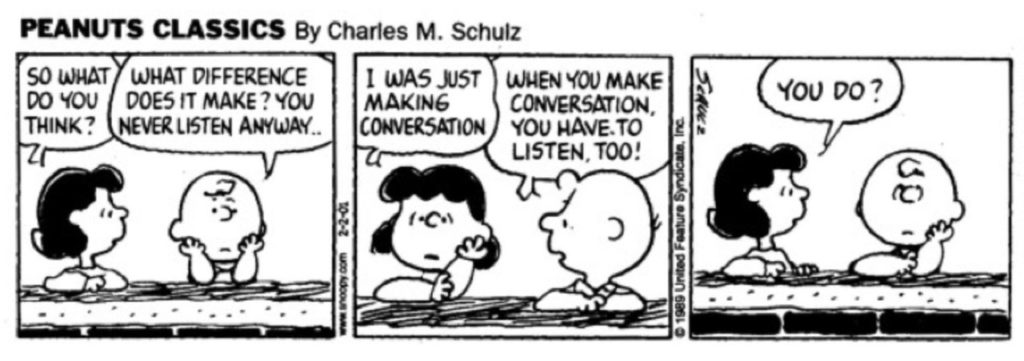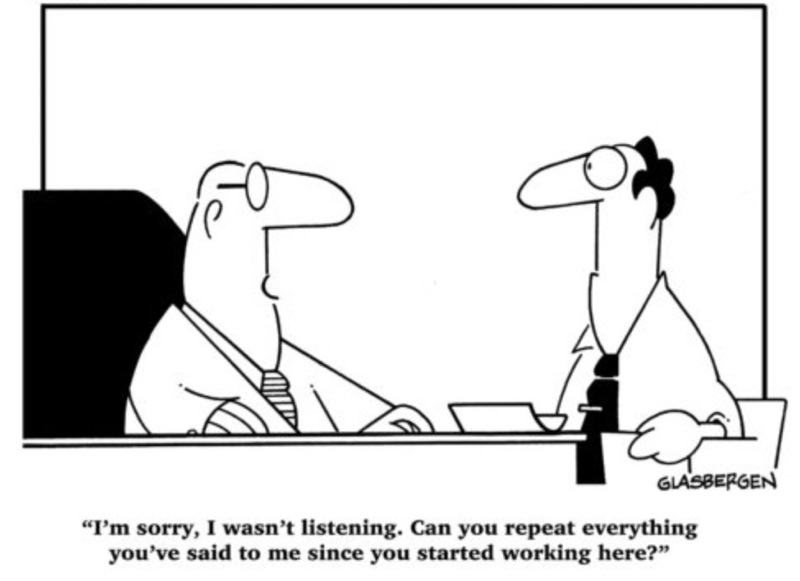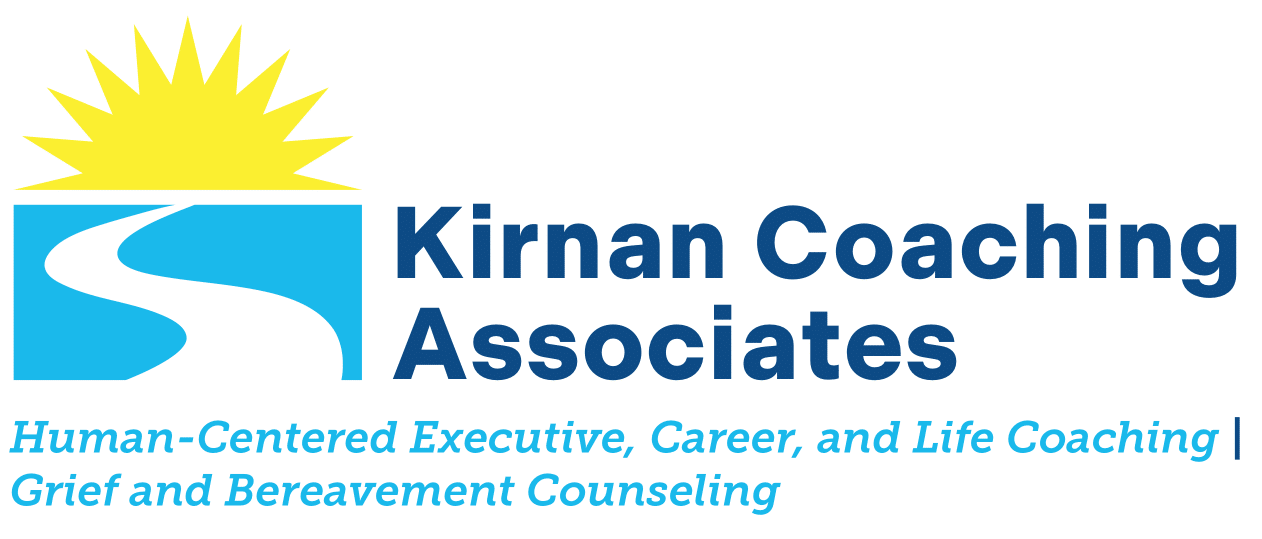“Listening isn’t a need we have; it’s a gift we give”.
The Lost Art of Listening, Michael P. Nichols, Ph. D.
“Know this, my beloved brothers: let every person be quick to hear, slow to speak, slow to anger”.
James 1:19
Are You a Good Listener?
Almost 2,000 years ago, the Greek philosopher Epictetus said that “we have two ears and one mouth so that we can listen twice as much as we speak”. Those words still resonate today as we are presented with countless opportunities to engage in conversation with others and the challenge to listen intently to what is being shared with us. Becoming a good listener is an important skill that can be developed in ways that can really transform us and deepen those personal and professional relationships that we deeply care about. Good listening skills can facilitate a greater understanding of the differences that currently divide us across gender, geography, age, ethnicity, cultural, and even socioeconomic levels. Yet, my strong sense is that listening has become a lost art as more and more people today express a frustration that they are not being heard in the manner that they would like to be heard, an observation gleaned from my experiences as a professional coach, husband, father, son, brother, friend, volunteer, and caregiver. Deep down, we all have this universal “urge to be heard” but do we really listen to others as well as we could and should? Do we fully use the gift of the two ears that Epictetus speaks of to understand what is being said to us? Or, do we simplistically listen through a lens that is often colored by our emotions and whether what we are hearing already fits neatly into our pre-existing mental models of how to listen? In today’s culture, we learn through professional and personal development programs the importance of “active listening”, of “being heard”, and that we need to “give voice” to those who have felt neglected to give us a window into how others we interact with might see the world around them. Such concepts, if broadly adopted, offer us the hope that true, active listening and a modicum of civility can someday return to our everyday discourse as well as how we communicate in the public square.

Listening Takes Many Different Forms
Active listening is not just confined to those occasions where we are engaged in conversation with someone. For example, there’s the concept of how we listen to what our bodies might be telling us. Thankfully, I have become much better at practicing this form of listening since having a major health scare in July 2017. I had been experiencing shortness of breath and tightness in my chest for several months before finally deciding to contact my cardiologist. Much to my surprise, an angiogram revealed that my main artery was 80% blocked. Fortunately, I listened to my body and made that phone call to Dr. Costin and underwent a successful stent procedure. Then about six weeks ago, I called my gastroenterologist soon after experiencing some severe stomach pain and upper shoulder discomfort. An endoscopy and an ultrasound revealed that I had extensive ulcers and gallstones and so I had gall bladder surgery on March 19th. I feel fantastic and am already walking 6-7 miles a day, have resumed working out on the elliptical machine, and am just days away from getting back into the pool and swimming laps again, my favorite activity of all. I am extremely grateful to have heeded that call to listen and be mindful of what my body was telling me. It’s something that I had long denied for my entire life because as a former athlete and marathon runner, you are taught to fight through the pain. Thank God I finally listened.
There’s also a spiritual aspect to how we listen which for many of us takes place through the practice of meditation, yoga, or a faith-based approach where we probe deeply into an examination of our conscience and search for what God might be asking us to do. In Ignation Spirituality which I adhere to, we engage in the Daily Examen and look for all the ways we can see God in all people and in all things.
The Signs of Not Being Heard
Given our often-hectic schedules these days, many of us try to perfect another art form, that of multi-tasking. You know, those everyday things that I know I do without even thinking about it — like catching up with email and text messages on the mobile phone while also trying to engage in conversation with someone; or, listening to that great podcast on our To Do List (often at speeds of 2.0-2.5) while working out on the elliptical machine with eyes transfixed on the TV monitor for breaking news or the latest scores from ESPN; or, maybe it’s what we do after work and you are back home sitting in front of the TV with a friend or family member and you scroll through Netflix for something to watch with your iPad on your lap ready to sneak a peek at the Mets game while downloading a song from iTunes or ordering a thing or two from Amazon.
Lately, I keep asking myself whether I am doing each of these tasks really well or am I just fooling myself and actually doing each task poorly and missing out on an opportunity to engage more deeply with the people who matter the most to me in my life. So, as I began to reflect more deeply on how well I actually listen, I wrote down some of the phrases that often characterize a conversation in which one of the parties involved feels they are not being heard. Perhaps, one or more of these expressions may resonate with you from your own experience in conversation at home or at work:
“Did you even hear what I said?”
“Let me finish please!”
“Could you please stop interrupting me!”
“Let me know when it’s my turn to talk!”
“You only hear what you want to hear!”
“Why do you always overreact to everything that I say!”
“He (She) never listens to me or what I have to say!”
“It’s like He (She) is already thinking of what they are going to say to me as I am talking to them. How can they possibly be listening to me?”

How well we listen to someone can affect how we respond to them, creating an ongoing dynamic in that what we say shapes not only our own actions but also the actions of those who are listening to us. This ongoing dynamic between speaker and listener highlights why it can be really helpful to examine our own listening habits. For openers, sometimes we are just too exhausted to engage and listen to someone or we may find the conversation boring and repetitive. At other times, we may be pre-occupied with too many other things that are going on in our lives and so we don’t have enough bandwidth to be able to fully invest in the conversation. There are also a number of conversations we engage in where our “automatic tendencies” kick into high gear and we subconsciously assess whether what we are hearing fits neatly into our existing mental models of the topic at hand — i.e., do we like or dislike what we are hearing and is it right or wrong? We also hear things selectively through a filter of whatever “unconscious biases” we may hold about people, their gender, ethnicity, geographical origin, or even socioeconomic status. It’s important to identify these “unconscious biases” that we may hold as it may preclude an opportunity for the transformative change that we might be seeking in how we listen to others. “Confirmation bias” is another filter or prism that we may not consciously be aware of where whatever we hear in the conversation gets assessed on the basis of what we already know, placing further constraints on our inquisitiveness and new possibilities for growth. Finally, there are times when what is being said and heard triggers a strong “emotional response” — i.e., defensiveness, anxiety, reminders of past conflict, etc. — and we respond either in anger or withdraw from the conversation at hand. Understanding what those triggers are can be a really important step in becoming a better listener.
The Joyful Moments That Can Come from Being Heard
Knowing and acknowledging those moments when you or someone you interact with has been heard can be transformational. In such moments, we often hear heartfelt, empathetic phrases like:
“Thanks for listening to me”
“Take your time, I’ll listen”
“Thanks for telling me. I never knew you felt that way”
“I can see that you are upset”
“I’m sorry you’re going through that.”
“That’s rough. How can I be of help?”
“Let me make sure I have this right”
“Could you tell me a bit more about that?”
Often the people with whom we are engaging in conversation are not looking for our insights, suggestions, or even wisdom; rather, they just want someone who will pay attention to them and who, by their very presence, can acknowledge what they are sharing. Sometimes it’s best when we sit with someone to remain silent because it can help the person validate that what they have shared actually matters to someone else in their life.
Spiritually, James 1: 19 — “…let every person be quick to hear, slow to speak, slow to anger” — lays out a thoughtful template which challenges us on how to become a better listener. Can I be “quick to hear” in giving someone my undivided attention when they speak to me? Perhaps the hardest question of all — Can I be “slow to speak” and not always feel the innate urge to have to respond immediately to everything someone is saying to me? Can I be “slow to anger” when what I might hear touches an emotional trigger from my past interactions or experiences with a particular person?
Becoming a better listener can also be enhanced by adopting the simple acronym WAIT to our interactions. WAIT, which stands for “Why Am I Talking?”, doesn’t mean that I can’t respond to what I hear but rather to be honest with myself about what is really motivating me to say what I plan to say. Does my response to someone show that I understand what they are saying to me or does my response say something more about me and my own agenda? The very best CEOs often exhibit this artful skill of how to apply WAIT in their interactions with the employees and people they have been entrusted to lead because they know that what they say and how they say it can either promote or shut down productive dialogue.
A Quick Test to Assess Your Listening Skills
Have you ever really examined the way you listen to others in conversation? The following assessment tool can help you identify what your current strengths are and where there might be opportunities to improve your listening skills. In taking the assessment, think of a specific person you have a relationship with when you answer each of the 25 questions below. Consider completing this assessment twice – once with a family member in mind and a second time with either a business colleague or a friend. By the way, there are no right or wrong answers so please answer each questions as honestly as you can.
Answer each question below using the following 4-point scale:
1 — Almost Never; 2 – Sometimes; 3 – Often; 4 – Almost Always.
When someone is talking to you, do you:
____ 1. Make people feel that you’re interested in them and what they have to say?
____ 2. Think about what you want to say while others are talking?
____ 3. Acknowledge what the speaker says before offering your own point of view?
____ 4. Interrupt before the other person has finished speaking?
____ 5. Allow people to complain without arguing with them?
____ 6. Offer advice before you are asked?
____ 7. Concentrate on figuring out what other people are trying to say?
____ 8. Share similar experiences of your own rather than inviting the speaker to elaborate on their own experience?
____ 9. Get other people to tell you a lot about themselves?
____ 10. Do you assume you know what someone is going to say before he or she is finished?
____ 11. Restate or paraphrase messages to make sure you understood what you just heard?
____ 12. Make judgements about who is worth listening to and who isn’t?
____ 13. Make an effort to focus on the speaker and understand what he or she is trying to say?
____ 14. Tune out when someone starts to ramble on rather than trying to get involved and make the conversation more interesting?
____ 15. Accept criticism without getting defensive?
____ 16. Think of listening as instinctive rather than as a skill that requires making an effort?
____ 17. Make an active effort to get other people to say what they think and feel about things?
____ 18. Pretend to be listening when you are not?
____ 19. Respect what other people have to say?
____ 20. Feel that listening to other people complain is annoying?
____ 21. Make effective use of questions to invite people to say what is on their minds?
____ 22. Make distracting comments when other people are talking?
____ 23. Think other people consider you to be a good listener?
____ 24. Tell people you know how they feel?
____ 25. Remain calm when somebody gets angry with you?
Scoring and Interpreting the Assessment
For the odd-numbered questions, give yourself 4 points if you answered, “Almost Always”, 3 points for “Often”, 2 points for “Sometimes”, and 1 point for “Almost Never”. For the even-numbered questions, give yourself 4 points for “Almost Never”, 3 points for “Sometimes”, 2 points for “Often”, and 1 point for “Almost Always”. Total the number of points you scored for the 25 questions and compare your score to the Scoring Key Below:
85-96 Excellent Listener
73-84 Above Average Listener
61-72 Average Listener
49-60 Below Average Listener
25-48 Poor Listener
Source: Assessment adapted from The Lost Art of Listening, Michael P. Nichols, Ph.D., Second Edition (2009)
Epilogue: Some Final Questions to Ask Yourself:
Once you’ve completed the assessment and examined your score, take a moment to reflect on the following questions as a potential roadmap for improving your listening skills:
- Who is the best listener you know and what makes that person such a good listener — not interrupting, not acknowledging what you said, or asking you good questions? What is being with that person like and what can you learn from that person to be a better listener?
- What holds you back from talking to important people in your life and what are the consequences for those relationships?
- Can you identify someone in your life who you would like to listen to you more attentively? How might that affect the relationship?
- If you improved the way you listen to others, who would you want to notice and what conversations might go in a different direction?
- If people think you aren’t listening to them, what will people assume it means?
- If people think you are listening to them, what might they assume it means?
Good luck in examining the many different ways you can become a better listener — I know it can help transform those personal and professional relationships that matter the most to you. Take the time for silence every day and listen to yourself and to what your heart and body might be telling you. Listen spiritually for God’s gentle voice to help you know what He wants, so you can want what He wants, and do what He wants. Listen for him and he will find you and help lighten the load for all those heavy crosses we carry on the journey.
Wishing all of my fellow coaches, colleagues, and friends the gift of God’s abundant Blessings,
Dr. K




